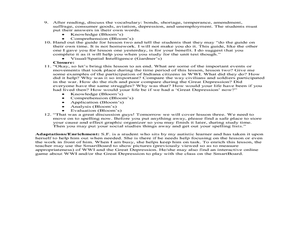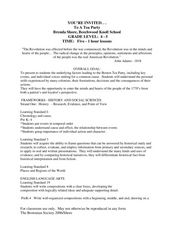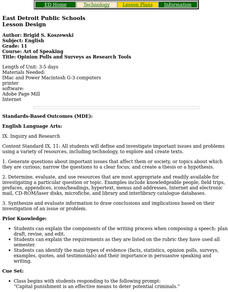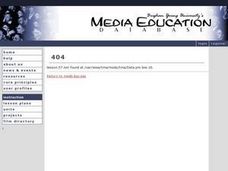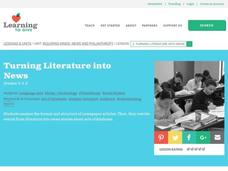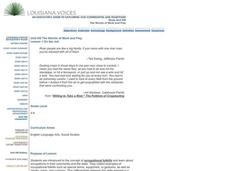Missouri Department of Elementary
How We Are Alike And Different
Scholars develop social awareness by exploring the concept of similarities and differences. Learners examine two beverages and use a Venn diagram to identify similarities and differences. They tally each item to identify if they are more...
Curated OER
WWI & Depression
Fourth graders describe WWI influence in Indiana. In this guided reading instructional activity students read about the participation of Indiana citizens during World War I. Students give examples of event that changed life in Indiana...
Curated OER
"The Story of Ruby Bridges"
Third graders examine the role of Ruby Bridges in the U.S. Civil Rights Movement. They listen to the teacher read the book "The Story of Ruby Bridges" by Robert Coles, identify what is fact or opinion in the story, and sequence events in...
Curated OER
Genetic Engineering: Friend or Foe?
Students brainstorm and discuss ways genes can be altered, transferred and cloned. They will complete a subject sampler, opinion paper and prepare to debate their opinion on genetic engineering.
Curated OER
Dr. Heidegger's Experiment
Examine the idea of perpetual youth and immortality while you read Nathaniel Hawthorne's Dr. Heidegger's Experiment. Some links work to direct your learners to information about the Fountain of Youth. Using this information, scholars...
Curated OER
Critical Consumerism
What are ads really selling? High schoolers examine persuasive techniques used by print and television advertisements. They generate a list of persuasive techniques they're familiar with, and review other types argumentation and...
Curated OER
Homemade Political Parties
Use this 5-day lesson to clarify the platforms of the two major parties, comparing and contrasting against students' beliefs. Begin by looking at unlabeled summaries of both party platforms, having learners identify most with one. Groups...
Curated OER
You're Invited...To A Tea Party
Kids read the book Boston Tea Party by Steven Kroll and use maps to locate various landmarks. They identify the cause and effect of the events related to the Boston Tea Party, then write a descriptive composition.
Southern Nevada Regional Professional Development Program
Common Core Reading Standards: Understanding Argument
What does your class know about logical fallacies? They can find out quite a bit and practice identifying logical fallacies if you follow the steps and use the resources provided here! After reviewing ethos, pathos, and logos, ask small...
Curated OER
Opinion Polls And Surveys As Research Tools
Eleventh graders determine, evaluate, and use resources that are most appropriate and readily available for investigating a particular question or topic. Examples include knowledgeable people, field trips, prefaces, appendices,...
Curated OER
Grappling With War: A Discussion of the Conflict in Iraq
Students examine historical relationship between the United States and Iraq, and differentiate between fact and opinion.
Curated OER
Body and Media #1
Young scholars examine how films and media affect their body image. They identify their own definition of body image and research the topic. They discover the importance of using both fact and opinion sources.
Curated OER
Inquiring Minds: News and Philanthropy
Students study newspaper articles and rewrite events from literature into news stories about kindness. In this news article lesson, students read sentences from newspaper articles and identify the purpose of the article. Students...
Curated OER
On the Job
Learners identify the concept of occupational folklife and learn about occupations in their community and the state. Then they collect examples of occupational folklife such as special terms, equipment, or gestures, as well as stories,...
Curated OER
Entry-Level Job Interviewing
Students are able to discover specific information to remember when preparing for an interview and identify the most important factors to keep in mind during an interview. They are able to critique a video of a person being interviewed...
Curated OER
What is Diabetes?
Students examine basic information about diabetes and related vocabulary words. They explore various health websites, complete a worksheet, discuss the worksheet answers and discuss diabetes myths vs. facts.
Curated OER
The Farmer Cares for the Land
Students explore farming by creating visual demonstrations. In this agriculture lesson, students read assigned text about a farmer's duty and identify the events that have taken place in the history of agriculture. Students collaborate...
Curated OER
Presidential Debate Primer
Students examine the function of presidential debates. In this civics lesson, students view segments of presidential and vice presidential debates. Students analyze the answers given in the debates and identify the platforms of the...
Curated OER
Native Cultures and Values
Students learn about Native American culture. For this history and diversity lesson, students use a website to create a timeline of significant events, contributions, growth and developments of Native American culture groups. Students...
Curated OER
Ida Tarbell: Hysterical Woman vs. Historical Facts
Students examine journalism and its different styles. In this effective communication instructional activity students create an editorial message and articulate an article.
Curated OER
Identifying Propaganda Techniques
For this propaganda techniques worksheet, students write the technique next to the sentence read by a candidate. Students complete 12 problems.
Social Media Toolbox
Ethical Decision Making
When faced with a dilemma, how do journalists decide how much news to use? Social media scholars explore the philosophies of ethical resolution in the first of a 16-part Social Media Toolbox series. Partnered pupils use a Potter Box to...
NOAA
Stressed Out!
Are our oceans really suffering due to the choices humans make? The sixth and final installment in the volume of activities challenges research groups to tackle one of six major topics that impact ocean health. After getting to the...
Curated OER
What Did You Say?
Twelfth graders identify main ideas in reading selections. They read newspaper letters to the editor, identify the main ideas, list the supporting details, and present each side of the issue to the class.



